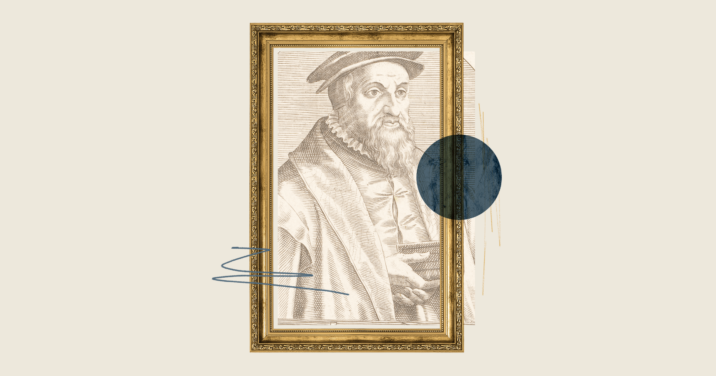With the church under attack and the safety of believers and the furtherance of the gospel at stake, what would a professor say to his students? Peter Martyr Vermigli (1499–1562) turned to the Psalms—as Christians have long done—as a source of comfort, encouragement, and guidance in prayer.
A Protestant Reformer in the mid-sixteenth century, Vermigli fled his home of Italy in 1542 for Switzerland. There he was appointed professor of Old Testament in Strasbourg and became a popular lecturer. At the end of his classes, he prayed a series of prayers that he wrote from his reflections on the Psalms, now collected in Sacred Prayers Drawn from the Psalms of David.1 This book, though published posthumously, was his most popular work aside from his Loci Communes.2
Vermigli wrote these prayers at least partly in the context of the First Schmalkaldic War (1546–1547). He was attuned to the pains and sorrows that the church as a whole was suffering as Emperor Charles V waged war against Protestants. He himself worried for the fate of the church.3 In these circumstances, Vermigli naturally found in the Psalms expressions that could articulate his and his fellow believers’ fears and hopes.
Wait with courage
Vermigli’s prayers were marked by a surprisingly staid calm. Again and again, he freely expressed the oppression the church felt, and he openly confessed the church’s sins and that it rightly deserved punishment. But he prayed with confidence that God would forgive and deliver his people.
Reflecting on Psalm 23, Vermigli expressed the church’s hope: “We shall always find our support in your mercy so that in your house on the last day we shall enjoy the supreme delights of eternity.”4 Trusting in God’s sovereign care, Vermigli echoed Psalm 37 by asking God to grant his people “serene and patient hearts” to let God “direct [their] affairs as seems best to [his] goodness” and to help them “wait with courage.”5
Such courageous patience was desperately needed in the face of the church’s adversaries. Indeed, when David spoke of enemies in the Psalms, Vermigli thought of them as enemies of the whole church. Thus he called them in his prayer on Psalm 58 “the enemies of your name and of your teaching.”6
As Vermigli reflected on the Psalms, then, he read them as speaking to the corporate church. Drawing on Psalm 5, where David prays, “Give ear to my words, O Lord,” Vermigli brought in the corporate church: “We fly to you, almighty God, in our daily prayers, and we put before you each morning our requests.”7
These various themes recur throughout Vermigli’s prayers on the Psalms, and his petition from Psalm 56 captures them well:
Daily we continue to pray for your mercy, O almighty God, when those who try to swallow up the Church never stop attacking her in various ways. … They watch for and seize upon every chance to demolish your Church. Do not despise, O God, the prayers and sighs of your faithful people. … Deliver our souls from sin and destruction so that now and after this life we may be granted to enjoy your joyous and blessed light.8
One should not miss Vermigli’s focus on this delight in God, which is to shape the entire church’s greatest longing. Echoing Psalm 31, Vermigli exclaims, “Great, indeed, and splendid and joyous is the sweetness of your goodness which you have reserved for those who trust in you”—you who are “the height of our happiness.”9
Pray for the global church
When we read and study the Psalms today, Vermigli’s corporate approach reminds us to pray them not only for ourselves but for—and with—the global church. This corporate impulse draws us out of ourselves to connect to the whole body of Christ. And the Psalms redirect us to what is the true, joint hope of all believers: joy and delight in our gracious God. So we may rightly pray with the church this overarching prayer, echoing Vermigli’s reflection on Psalm 37: “May [we] place all our pleasure and delight in you alone.”10
***
This article was originally published in the September/October 2022 issue of Bible Study Magazine. Slight adjustments, such as title and subheadings, may be the addition of an editor.
Related articles
- Peter Martyr Vermigli, Sacred Prayers Drawn from the Psalms of David, Peter Martyr Library 3, Sixteenth Century Essays and Studies 34 (Kirksville, MO: Sixteenth Century Journal, 1996).
- John Patrick Donnelly, “Introduction: The Psalms and Reformation Piety,” in Vermigli, Sacred Prayers, xx.
- Donnelly, “Introduction,” xiv–xix.
- Vermigli, Sacred Prayers, 24–25.
- Vermigli, Sacred Prayers, 35.
- Vermigli, Sacred Prayers, 5.
- Vermigli, Sacred Prayers, 9; emphasis added.
- Vermigli, Sacred Prayers, 56.
- Vermigli, Sacred Prayers, 31.
- Vermigli, Sacred Prayers, 36.






